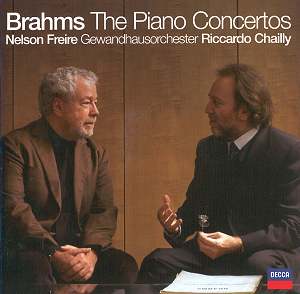There is, of course,
no shortage of truly great recordings
of these two masterpieces in the present
catalogue, but itís fair to say there
are also a number of pretty dire ones
alongside them. I was more than a little
curious how two volatile artists like
Freire and Chailly would fare in these
muscular, Germanic warhorses. Iím glad
to report some positive results.
I think my overriding
observation has been the thoroughly
superb playing of the Leipzig orchestra.
Itís quite a while since I heard them
on disc, but my collection boasts a
number of memorable performances, particularly
a Mendelssohn 3 and 4 with Masur and
the famous Jessye Norman Strauss ĎFour
Last Songsí where, as here, the beauties
of the orchestral detail almost threaten
to overshadow the soloistís contribution.
The opening tutti
of the D minor is simply thrilling,
the swift tempo and cast-iron rhythms
recalling Szell in his heyday. I donít
think Iíve ever heard the string trills
played with such accuracy yet with no
trace of the mechanical. Woodwind are
also beautifully balanced, with a luminous
transparency that sounds almost Ďperiodí.
As I say, the tempo is swift, but Freire
still manages to make his entry sound
natural and unhurried, something the
young Stephen Hough doesnít quite manage
on his similarly paced and otherwise
admirable Virgin version with Andrew
Davis and the BBCSO. Conductor and soloist
engage in some wonderful dialogue, knowing
when to build the dramatic tension and
release those wonderful climactic moments.
The coda is a good example, the welter
of orchestral and piano sonority building
inexorably but with no vulgarity or
harshness. This is great artistry caught
Ďon the wingí.
In many ways the B
flat Concerto is just as successful,
if not quite as naggingly memorable.
Chailly and Freire stress the lyrical,
vocal qualities in the work just as
much as my previous benchmarks, Brendel
and Abbado on Philips. Tempos again
are flowing, something that suits the
slow movement particularly well. How
often the cello solo gets bogged down
with slow speed and muddy textures Ė
not here, Chailly making sure that any
hint of sentimentality is kept firmly
at bay. Maybe itís the two Latin temperaments
working here, but the urgency and clarity
of the playing is infectious. The finale
of the B flat has lightly sprung rhythms
that recall Mendelssohn without losing
any weight or passion. Freireís superb
pianism can hardly be faulted; Iím not
sure heís ever Ďcaught oní over here,
but itís easy to hear why his friend
Martha Argerich rates him so highly,
with effortless virtuosity put entirely
at the service of the music.
The sound quality is
excellent, with the only hint that this
is Ďliveí being the odd shuffle and
stamp from the podium - Iíve heard noisier
from studio conditions - and the merest
rustle from the audience during hushed
passages and movement breaks. Yes, competition
in the two-disc formats is severe, but
nothing much to beat this set from the
modern digital era. Of the ones Iíve
heard, Haitink/Ashkenazy on Decca are
as musical as youíd expect but a touch
stodgy and severe for my liking. The
Hough/Davis twofer makes an outstanding
bargain on Virgin and there is the budget
Buchbinder/Harnoncourt on Warner Apex,
beautifully played and recorded but
almost five minutes longer in each concerto
and the very antithesis of the Freire/Chailly
approach. Having lived with this new
mid-price Decca for a few weeks now,
I know for sure who I would choose.
Tony Haywood


